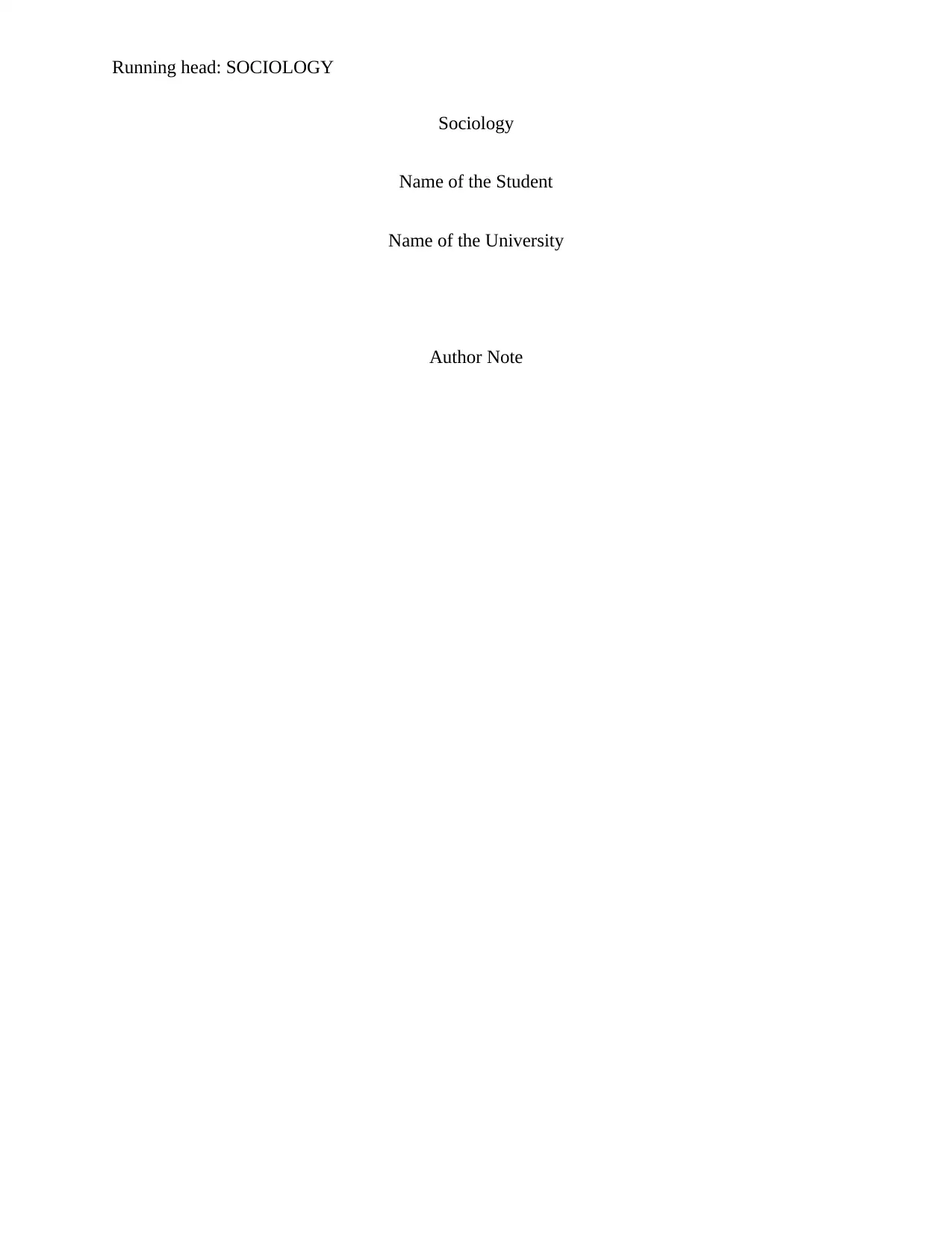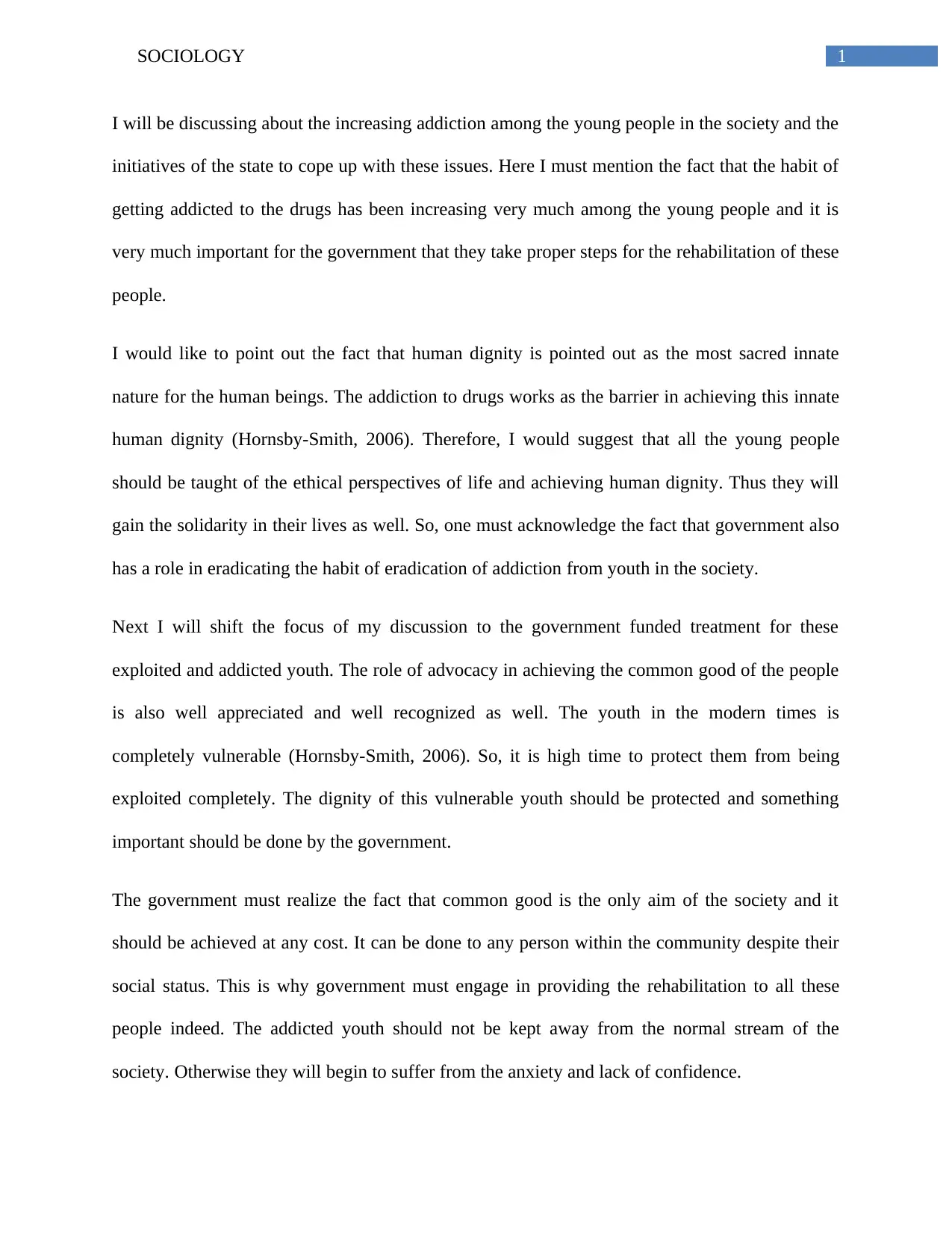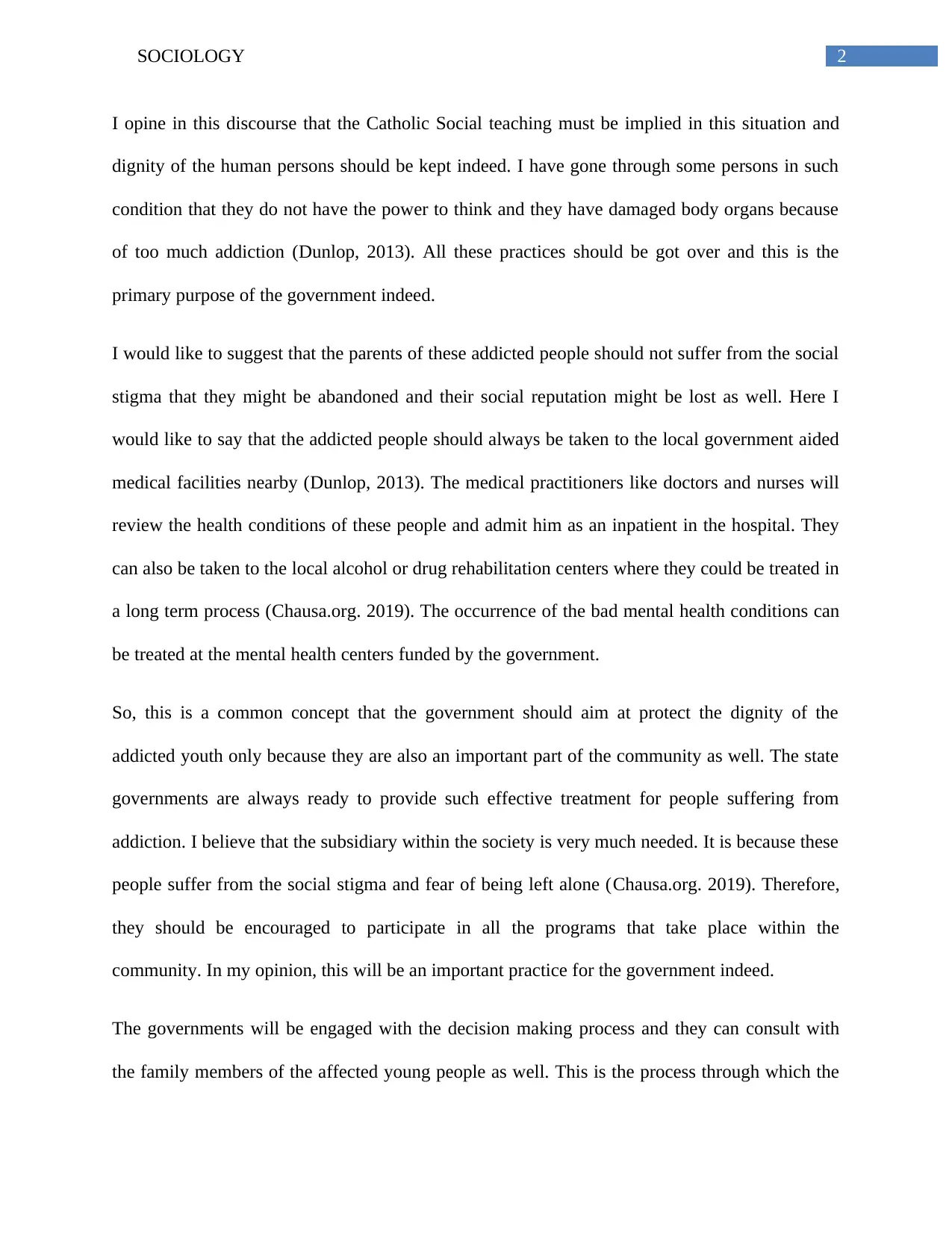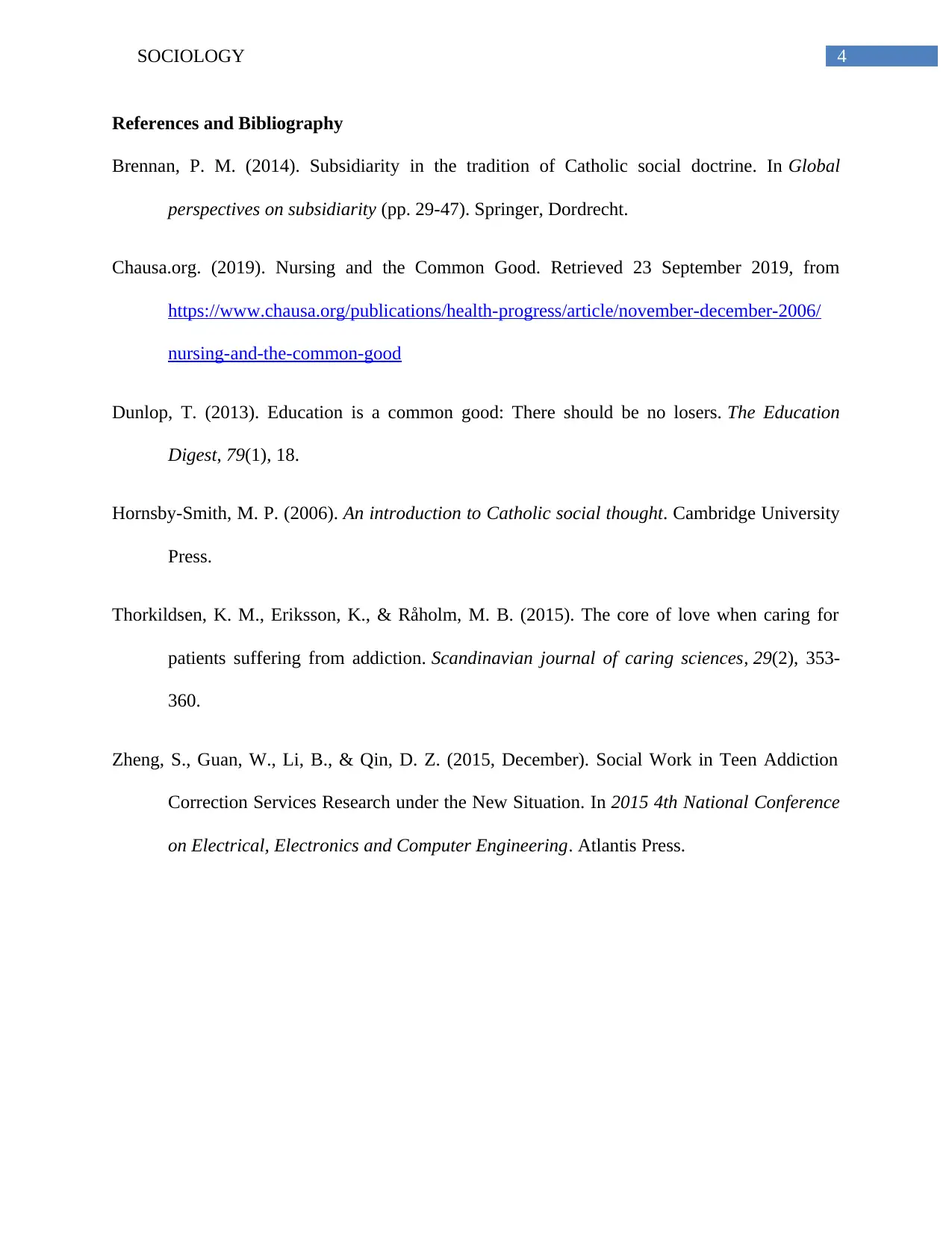Sociology Essay: Societal Impact of Youth Addiction and Solutions
VerifiedAdded on 2022/10/15
|5
|1000
|228
Essay
AI Summary
This sociology essay explores the increasing issue of addiction among young people and the government's role in addressing it. The author emphasizes the importance of human dignity and the ethical perspectives of life, advocating for the teaching of these values to youth to foster solidarity. The essay highlights the need for government-funded treatment and rehabilitation programs, referencing Catholic Social Teaching and the concept of the common good. It suggests that addicted youth should not be isolated from society and that parents should receive support, recommending access to local medical facilities and rehabilitation centers. The author emphasizes the importance of community involvement and the empowerment of affected individuals through participation in social programs, ultimately aiming for the achievement of the common good within the society.

Running head: SOCIOLOGY
Sociology
Name of the Student
Name of the University
Author Note
Sociology
Name of the Student
Name of the University
Author Note
Paraphrase This Document
Need a fresh take? Get an instant paraphrase of this document with our AI Paraphraser

1SOCIOLOGY
I will be discussing about the increasing addiction among the young people in the society and the
initiatives of the state to cope up with these issues. Here I must mention the fact that the habit of
getting addicted to the drugs has been increasing very much among the young people and it is
very much important for the government that they take proper steps for the rehabilitation of these
people.
I would like to point out the fact that human dignity is pointed out as the most sacred innate
nature for the human beings. The addiction to drugs works as the barrier in achieving this innate
human dignity (Hornsby-Smith, 2006). Therefore, I would suggest that all the young people
should be taught of the ethical perspectives of life and achieving human dignity. Thus they will
gain the solidarity in their lives as well. So, one must acknowledge the fact that government also
has a role in eradicating the habit of eradication of addiction from youth in the society.
Next I will shift the focus of my discussion to the government funded treatment for these
exploited and addicted youth. The role of advocacy in achieving the common good of the people
is also well appreciated and well recognized as well. The youth in the modern times is
completely vulnerable (Hornsby-Smith, 2006). So, it is high time to protect them from being
exploited completely. The dignity of this vulnerable youth should be protected and something
important should be done by the government.
The government must realize the fact that common good is the only aim of the society and it
should be achieved at any cost. It can be done to any person within the community despite their
social status. This is why government must engage in providing the rehabilitation to all these
people indeed. The addicted youth should not be kept away from the normal stream of the
society. Otherwise they will begin to suffer from the anxiety and lack of confidence.
I will be discussing about the increasing addiction among the young people in the society and the
initiatives of the state to cope up with these issues. Here I must mention the fact that the habit of
getting addicted to the drugs has been increasing very much among the young people and it is
very much important for the government that they take proper steps for the rehabilitation of these
people.
I would like to point out the fact that human dignity is pointed out as the most sacred innate
nature for the human beings. The addiction to drugs works as the barrier in achieving this innate
human dignity (Hornsby-Smith, 2006). Therefore, I would suggest that all the young people
should be taught of the ethical perspectives of life and achieving human dignity. Thus they will
gain the solidarity in their lives as well. So, one must acknowledge the fact that government also
has a role in eradicating the habit of eradication of addiction from youth in the society.
Next I will shift the focus of my discussion to the government funded treatment for these
exploited and addicted youth. The role of advocacy in achieving the common good of the people
is also well appreciated and well recognized as well. The youth in the modern times is
completely vulnerable (Hornsby-Smith, 2006). So, it is high time to protect them from being
exploited completely. The dignity of this vulnerable youth should be protected and something
important should be done by the government.
The government must realize the fact that common good is the only aim of the society and it
should be achieved at any cost. It can be done to any person within the community despite their
social status. This is why government must engage in providing the rehabilitation to all these
people indeed. The addicted youth should not be kept away from the normal stream of the
society. Otherwise they will begin to suffer from the anxiety and lack of confidence.

2SOCIOLOGY
I opine in this discourse that the Catholic Social teaching must be implied in this situation and
dignity of the human persons should be kept indeed. I have gone through some persons in such
condition that they do not have the power to think and they have damaged body organs because
of too much addiction (Dunlop, 2013). All these practices should be got over and this is the
primary purpose of the government indeed.
I would like to suggest that the parents of these addicted people should not suffer from the social
stigma that they might be abandoned and their social reputation might be lost as well. Here I
would like to say that the addicted people should always be taken to the local government aided
medical facilities nearby (Dunlop, 2013). The medical practitioners like doctors and nurses will
review the health conditions of these people and admit him as an inpatient in the hospital. They
can also be taken to the local alcohol or drug rehabilitation centers where they could be treated in
a long term process (Chausa.org. 2019). The occurrence of the bad mental health conditions can
be treated at the mental health centers funded by the government.
So, this is a common concept that the government should aim at protect the dignity of the
addicted youth only because they are also an important part of the community as well. The state
governments are always ready to provide such effective treatment for people suffering from
addiction. I believe that the subsidiary within the society is very much needed. It is because these
people suffer from the social stigma and fear of being left alone (Chausa.org. 2019). Therefore,
they should be encouraged to participate in all the programs that take place within the
community. In my opinion, this will be an important practice for the government indeed.
The governments will be engaged with the decision making process and they can consult with
the family members of the affected young people as well. This is the process through which the
I opine in this discourse that the Catholic Social teaching must be implied in this situation and
dignity of the human persons should be kept indeed. I have gone through some persons in such
condition that they do not have the power to think and they have damaged body organs because
of too much addiction (Dunlop, 2013). All these practices should be got over and this is the
primary purpose of the government indeed.
I would like to suggest that the parents of these addicted people should not suffer from the social
stigma that they might be abandoned and their social reputation might be lost as well. Here I
would like to say that the addicted people should always be taken to the local government aided
medical facilities nearby (Dunlop, 2013). The medical practitioners like doctors and nurses will
review the health conditions of these people and admit him as an inpatient in the hospital. They
can also be taken to the local alcohol or drug rehabilitation centers where they could be treated in
a long term process (Chausa.org. 2019). The occurrence of the bad mental health conditions can
be treated at the mental health centers funded by the government.
So, this is a common concept that the government should aim at protect the dignity of the
addicted youth only because they are also an important part of the community as well. The state
governments are always ready to provide such effective treatment for people suffering from
addiction. I believe that the subsidiary within the society is very much needed. It is because these
people suffer from the social stigma and fear of being left alone (Chausa.org. 2019). Therefore,
they should be encouraged to participate in all the programs that take place within the
community. In my opinion, this will be an important practice for the government indeed.
The governments will be engaged with the decision making process and they can consult with
the family members of the affected young people as well. This is the process through which the
⊘ This is a preview!⊘
Do you want full access?
Subscribe today to unlock all pages.

Trusted by 1+ million students worldwide

3SOCIOLOGY
affected people can be empowered (Thorkildsen, Eriksson & Råholm, 2015). This is how the
common good can be achieved within the society as well. Greater participation of addicted
people in the social process will enable them to be achieving common good and get over their
addiction.
affected people can be empowered (Thorkildsen, Eriksson & Råholm, 2015). This is how the
common good can be achieved within the society as well. Greater participation of addicted
people in the social process will enable them to be achieving common good and get over their
addiction.
Paraphrase This Document
Need a fresh take? Get an instant paraphrase of this document with our AI Paraphraser

4SOCIOLOGY
References and Bibliography
Brennan, P. M. (2014). Subsidiarity in the tradition of Catholic social doctrine. In Global
perspectives on subsidiarity (pp. 29-47). Springer, Dordrecht.
Chausa.org. (2019). Nursing and the Common Good. Retrieved 23 September 2019, from
https://www.chausa.org/publications/health-progress/article/november-december-2006/
nursing-and-the-common-good
Dunlop, T. (2013). Education is a common good: There should be no losers. The Education
Digest, 79(1), 18.
Hornsby-Smith, M. P. (2006). An introduction to Catholic social thought. Cambridge University
Press.
Thorkildsen, K. M., Eriksson, K., & Råholm, M. B. (2015). The core of love when caring for
patients suffering from addiction. Scandinavian journal of caring sciences, 29(2), 353-
360.
Zheng, S., Guan, W., Li, B., & Qin, D. Z. (2015, December). Social Work in Teen Addiction
Correction Services Research under the New Situation. In 2015 4th National Conference
on Electrical, Electronics and Computer Engineering. Atlantis Press.
References and Bibliography
Brennan, P. M. (2014). Subsidiarity in the tradition of Catholic social doctrine. In Global
perspectives on subsidiarity (pp. 29-47). Springer, Dordrecht.
Chausa.org. (2019). Nursing and the Common Good. Retrieved 23 September 2019, from
https://www.chausa.org/publications/health-progress/article/november-december-2006/
nursing-and-the-common-good
Dunlop, T. (2013). Education is a common good: There should be no losers. The Education
Digest, 79(1), 18.
Hornsby-Smith, M. P. (2006). An introduction to Catholic social thought. Cambridge University
Press.
Thorkildsen, K. M., Eriksson, K., & Råholm, M. B. (2015). The core of love when caring for
patients suffering from addiction. Scandinavian journal of caring sciences, 29(2), 353-
360.
Zheng, S., Guan, W., Li, B., & Qin, D. Z. (2015, December). Social Work in Teen Addiction
Correction Services Research under the New Situation. In 2015 4th National Conference
on Electrical, Electronics and Computer Engineering. Atlantis Press.
1 out of 5
Your All-in-One AI-Powered Toolkit for Academic Success.
+13062052269
info@desklib.com
Available 24*7 on WhatsApp / Email
![[object Object]](/_next/static/media/star-bottom.7253800d.svg)
Unlock your academic potential
Copyright © 2020–2026 A2Z Services. All Rights Reserved. Developed and managed by ZUCOL.


